What exactly will a green roof achieve in the future?
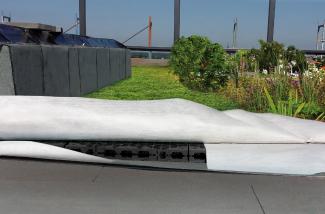
The ZinCo spacer creates space for water storage while above it virtually any type of green roof and roof utilisation is possible.
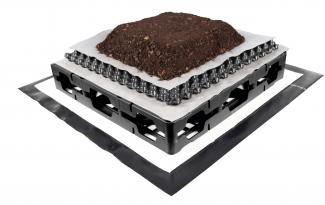
System build-up for the “Stormwater Management Roof“
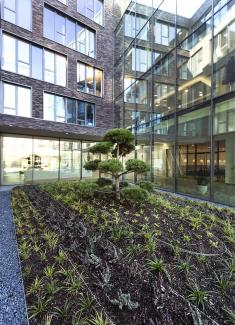
The new “Stormwater Management Roof“ at Mitsubishi Electric Europe B.V. in Ratingen/Germany consist of 3,800 m² of extensive green roof and 640 m² intensive green roof. © Mitsubishi Electric Europe B.V.
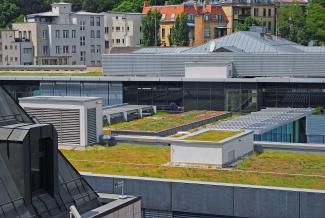
In urban centres, the system build-up for the “Urban Climate Roof“ provides for an increased cooling of the ambient temperature thanks to a maximum evaporation capacity.
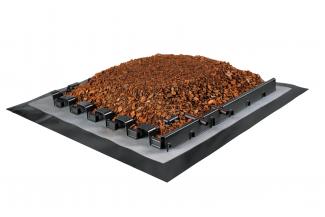
Thanks to a combination of the drainage element, irrigation control and the substrate, the plants always have sufficient (grey) water in order to develop their high level of evaporation capacity.
Increasingly overheated towns and cities, on the one hand, and an increase in heavy rain events, flooding and a reduction in the water table on the other are creating problems for conurbations. It is a clear sign that the ecology of the water cycle has been seriously disturbed – the result of climate change and land sealing. This is where a green roof comes into play. It stores stormwater and allows it to drain off at pre-defined intervals or to evaporate on the roof. However, these features will only achieve the desired effect if sufficient roof area is greened and at the same time the effectiveness of the green roof is increased in terms of water retention and evaporation.
Many local authorities are already addressing this issue! Whether it is Germany, France or the Netherlands, many cities have recognised the need to act and have already adopted appropriate subsidy programmes or are about to approve them. Many architects and contractors in the green roof sector are also very interested in solutions and measures aimed at reducing the impact of climate change.
From stormwater management on the roof to optimised cooling capacity for an improved urban climate – the two new ZinCo system build-ups offer pioneering solutions.
The system build-up “Stormwater Management Roof” specifically multiplies the stormwater retention effect and balances precipitation peaks effectively. A standard extensive green roof stores between 20 and 40 l/m² of water, an intensive green roof between 50 and 100 l/m², in some cases even more. In this new Stormwater Management Roof, a so-called spacer is used beneath the actual green roof build-up. The spacer is height-adjustable. For example, a 10 cm high spacer allows for an additional 80 l/m² approx. of stormwater storage – assuming, naturally, a zero-pitch roof with the requisite structural capacity. This water then drains off slowly within a pre-defined time frame (between 24 hours and a number of days) through a throttle element installed in the roof drain, and into the sewerage system. In order to ensure that these elements continue to work properly, the drain and the throttle element are located inside the inspection chamber for protection, where fine slits prevent foreign particles from being washed into the system.
The green roof build-up over the spacer contains all the elements that are required for the green roof to function properly, for example, air-water household in the root area, drainage and water storage for the plants. Virtually all types of green roof and roof utilisation are possible, even pathways and driveways.
The system build-up “Urban Climate Roof”, in contrast, was developed with the aim of counteracting the rise in temperature in urban centres. Due to the sealing of our towns and cities, global radiation is now used differently. On sealed surfaces it can no longer be used as an engine for plant growth and can therefore hardly be used for evaporation for cooling. This means that the considerable increase in thermal radiation is heating up urban centres and the resulting urban heat islands are having a negative effect on general well-being. In addition, the increased level of sensible heat, or perceived heat, also means that it is uncomfortable to spend time here. Therefore, the system build-up “Urban Climate Roof” is designed to produce maximum evaporation – particularly in dry, hot periods – and to pro-actively contribute to the urban climate. This significant level of evaporation is achieved by a specially developed plant community in combination with appropriate irrigation, for which grey water can also be used. This was the requirement when developing the plant community as part of a DBU research project.
The system build-up “Urban Climate Roof” can be used for roofs with a pitch of between 0° and 5°. A combination of the two roofs is possible for roofs with a 0° pitch.
Vous pouvez obtenir des informations complémentaires auprès de:
ZinCo GmbH
Lise-Meitner-Str. 2
72622 Nuertingen
Allemagne
e-mail: bureau@zinco.fr